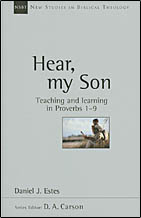
Proverbs 1-9 is an extended address on the value of wisdom from a father or elder teacher to a son or student that introduces the wisdom sayings of the remainder of Proverbs. In Hear, My Son: Teaching & Learning in Proverbs 1-9, Daniel J. Estes has taken a novel approach to this literature and written a monograph exploring the philosophy and practice of teaching and learning reflected in this instruction given in these chapters. It is part of New Studies in Biblical Theology (InterVarsity Press) series of monographs.
That may sound like dry, stodgy stuff but what Estes does is outline in a very straightforward fashion what we might learn from these texts about teaching and learning. The book is not an exposition of Proverbs 1-9 but rather a study of this discourse through the lens of what it teaches about education.
Here is the outline of the book. After an introduction describing and giving a rationale for this study, Estes looks first at the worldview underlying Proverbs as one seeing the universe as God’s creation, one with a moral order and rationality that reflect the character of God, and thus implying a proper reverence for God by humans and other creatures. He then turns to values for education, of which the top one is wisdom which is understanding how to live well and in accord with God’s order in the world, teachability, righteousness and life. Then follows a consideration of education’s goals:
- commitment on the part of the learner
- growth in character
- competence in living
- protection from folly and its consequences
- prosperity
- the knowledge of God.
The next sections turn to the nuts and bolts of education. Proverbs 1-9 describes a threefold curriculum of learning through observation of the world, through instruction in traditional wisdom passed along, and through revealed truth from God. He then turns to the educational process evident in this discourse which includes:
- an address (“hear, my son”)
- description of the wise and foolish
- various forms of commands and incentives
- an invitation to embrace the teaching.
This then leads to a consideration of the role of teacher and learner in this process. Because the teacher alternates between expert authority and the role of facilitating wisdom’s embrace, he sees the teacher as functioning as a knowledgeable guide in the learning process. Conversely the learner must
- receive
- respond to
- value
- and assimilate wisdom.
Estes then concludes the book by summarizing these chapters and outlining avenues for further exploration as well as by offering few comments on contemporary education.
What I most appreciate about this book is that it articulates an approach to education that integrates faith and rigorous study of the world rather than bracketing these off into separate ventures. In fact, the earliest scientists studied the world as well as theology to understand God’s order. Similarly, tradition, history, literature, and philosophy need not be opposed to either theology or science but all function together as a comprehensive curriculum to teach the fear of God, the order of creation, the cultivation of moral character, competence and common sense in the conduct of life. Competence and character, reason and faith walk together.
In sum, this book is a concise work that gives fresh insight into an aspect of Proverbs–teaching and learning–that has relevance for anyone engaged in the educational enterprise and particularly those who want to think Christianly about how education is done.
Note: Also posted as Review: Hear, My Son: Teaching & Learning in Proverbs 1-9 on Bob on Books (Bob Trube. 3/16/2014).
Bob Trube is Associate Director of Faculty Ministry and Director of the Emerging Scholars Network. He blogs on books regularly at bobonbooks.com. He resides in Columbus, Ohio, with Marilyn and enjoys reading, gardening, choral singing, and plein air painting.

Leave a Reply